Discovering Archaeology in the Athens Metro
Beneath the busy streets of modern...
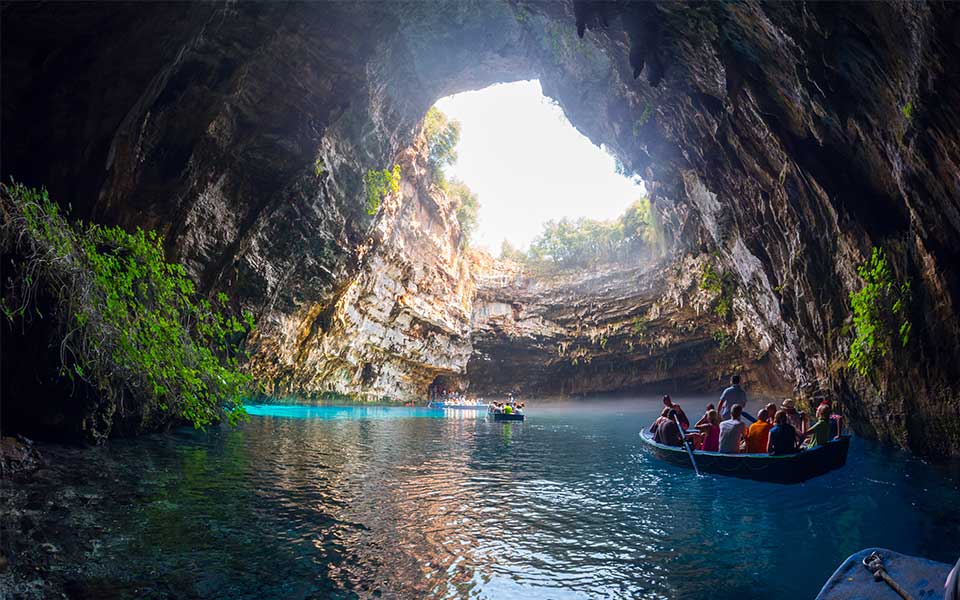
Melissani Cave, Kefalonia
© Shutterstock
Greece’s rugged landscape and endless, meandering coastline is home to thousands of cave systems – more than 8,500 by some estimates – making it a popular destination for travelers with an interest in geology, speleology, and the curious world of “spelunking,” aka caving.
Boasting all manner of weird and wonderful rock formations, such as stalactites (from the ancient Greek “to drip”) and stalagmites (“dropping, trickling”), accumulated over countless millennia, many of these subterranean wonders are linked to stories from Greek mythology, making them a mesmerizing fusion of wild, natural beauty and historical intrigue. Others have revealed important archeological discoveries, offering precious insight into Aegean prehistory.
Luckily, a good number of caves in Greece are open to the public, with on-site facilities, offering immersive tours by experienced guides. There are plenty to choose from, depending on where you are in the country. Some have been converted into religious sites, becoming important places of Christian worship. But whatever your religious or spiritual persuasion, for many people, a visit to a Greek cave is a deeply mystical experience.
In the following list, which runs from geographical north to south, we’ve cobbled together a selection of 10 of the country’s most spectacular caves for you to explore on your next visit. By no means exhaustive, we’ve tried include a diverse selection of sites to pique all tastes and interests, from magical sea caves, cathedral-sized caverns, to a renowned cave that was once inhabited by one of Europe’s earliest archaic humans.
Nestled in the scenic region of Drama in northeastern Greece (East Macedonia and Thrace), the Aggitis Cave, also known as “Maaras Cave,” invites visitors to experience its captivating beauty and geological wonders. Situated near the town of Prosotsani, at the southern foot of Falakro Mountain, this natural marvel marks the emergence of the ice-cold waters of the Aggitis River from the mountain’s depths. It stands as Greece’s longest and most voluminous cave, notable for being the country’s sole example of a river cave.
Exploration of the cave began in 1952, led by intrepid speleologists Yannis and Anna Petrocheilou of the Hellenic Speleological Society. However, it wasn’t until 1978 that French and Greek spelunkers reached a depth of 500m, confirming their theory of the river’s subterranean passage. Today, approximately 8.5km of the cave’s passages have been surveyed, with 2.5km accessible to visitors.
Upon entering, visitors are greeted by a mesmerizing display of stalactites adorned with vibrant hues, owing to mineral deposits like manganese, iron, and copper. Highlights include the “Wheel Chamber,” showcasing a 19th-century waterwheel used to irrigate nearby tobacco crops, and the remarkable “Acropolis Hall,” the largest chamber ever discovered in a Greek cave (120m long, 65m wide and 45m high).
Additionally, ongoing archaeological/paleontological excavations since 1992 have unearthed prehistoric artifacts and animal remains, including those of rhinoceros, giant deer, and mammoths, some of which are on display at Drama’s Museum.
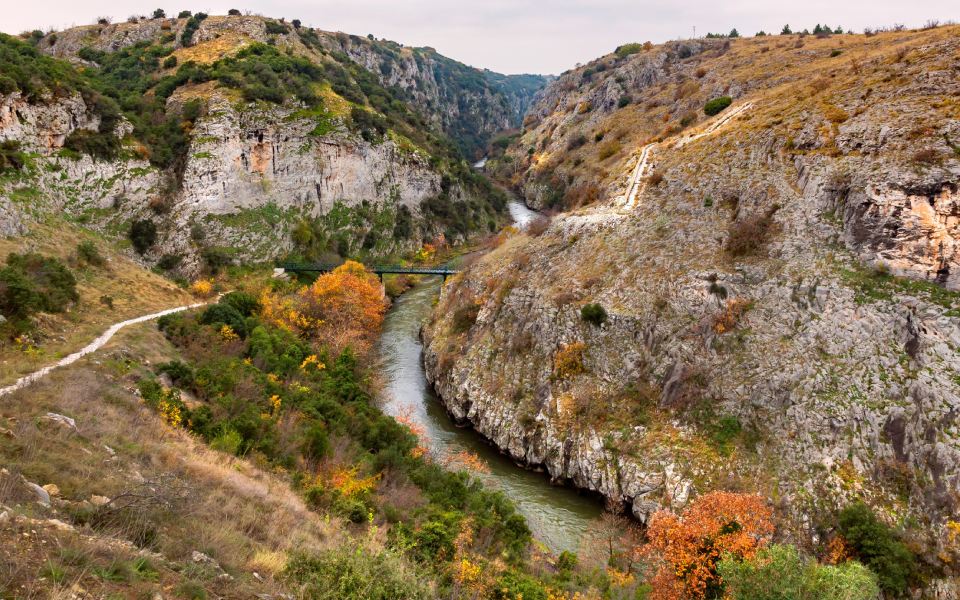
Alistrati Cave, Serres
© Shutterstock
Renowned as one of Europe’s most beautiful caves, Alistrati Cave is a must-visit destination for its breathtaking array of geological formations. Located 50km south of the bustling Central Macedonian city of Serres and just 6km from Alistrati town, it stands as a prominent tourist attraction in the region.
Legend intertwines with geological marvel within its depths, as myth recounts it as the passage through which Hades, god of the dead, spirited Persephone to the Underworld. Explored and officially documented in the 1970s, the cave now serves as a spectacular showcase of Karst formations (from the dissolution of soluble carbonate rocks). Alistrati Cave is also noted for its remarkable size, spanning 3km in length, with heights in some chambers reaching up to 35m.
From majestic stalagmites and stalactites to delicate helictites, aragonite crystals, and cave corals, the cave boasts a kaleidoscope of geological treasures unmatched in their beauty and variety. It is also home to a significant number of gravity defying “eccentrites,” a rare type of elongated rock feature (like a stalactite) that protrudes at angles from the cave ceiling.
Accessible year-round to visitors and accommodating of wheelchair users, the cave’s well-organized tours provide an immersive experience.
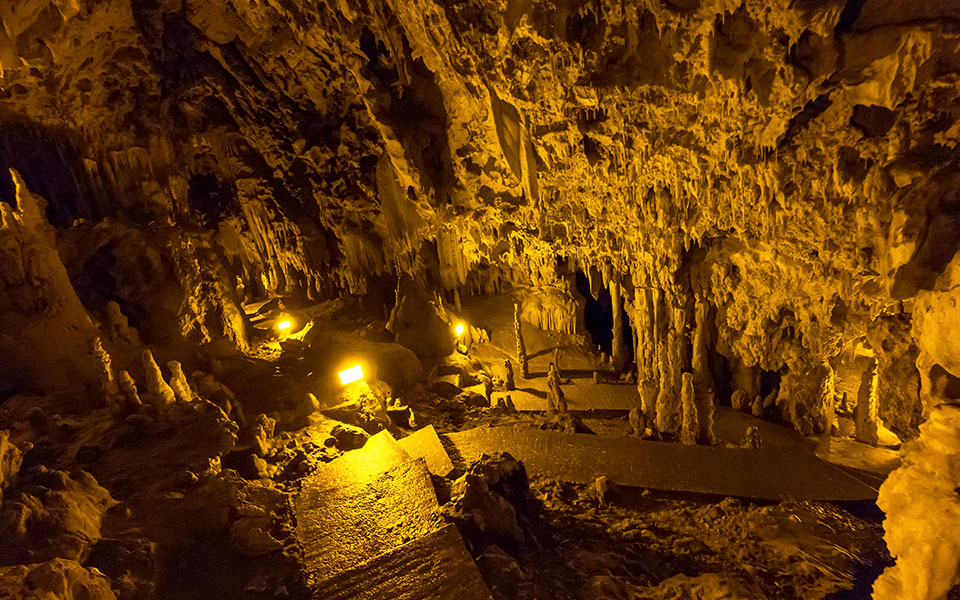
Perama Cave, Ioannina
© Shutterstock
Located 5km from the picturesque lakeside city of Ioannina in Epirus, Perama Cave is the largest cave in Greece, spanning an enormous 46 square kilometers. Its passages extend some 1.7km inside the bowls of Goritsa Hill.
The cave is geologically linked to the surrounding Lake Pamvotida, and was formed around 1.5 million years ago. It forms part of an underground riverbed, which was opened when the lake covered the entire plain area, and Goritsa Hill was an island.
The first modern reports of its existence date back to World War II, when the inhabitants of nearby Perama village took refuge during aerial attacks, although it is widely believed that locals have known about its existence since before 1900.
Perama Cave is predominantly limestone and is home to no fewer than 19 types of stalactites and stalagmites, an extremely large number. To put that in context, most other caves have around six to ten types at most. The cave consists of many successive chambers, adorned with impressive columns and other magnificent formations. In 1956, the fossilized remains of teeth and bones of a prehistoric cave bear (Ursus spelaeus) were found in one of the chambers
Today, the tourist route is 1,100m in length and covers an area of 14,800 square meters.
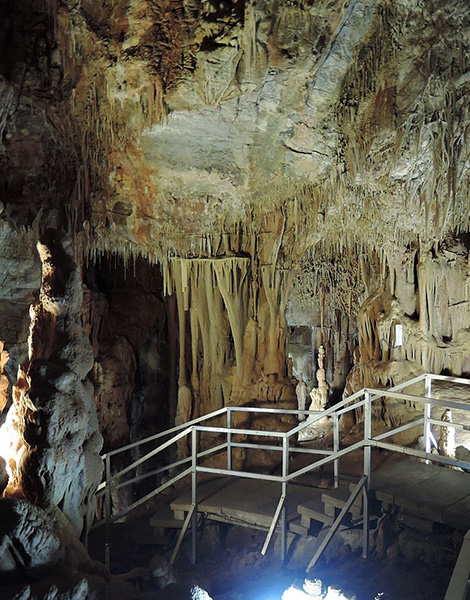
Petralona Cave, Halkidiki
© Carlstaffanholmer / Public domain
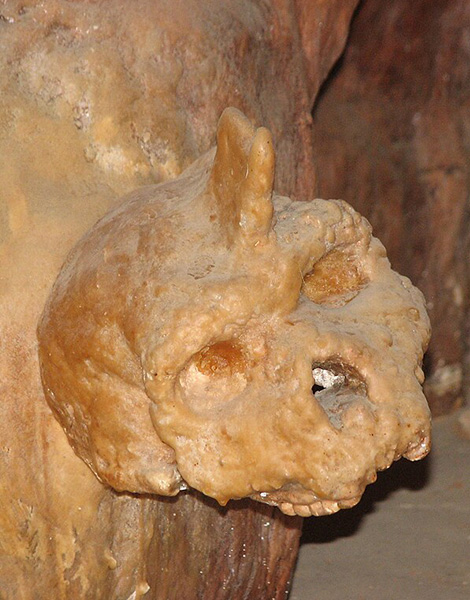
The Petralona skull
© Nadina / Public domain
Situated near Nea Moudania in the Central Macedonian region of Halkidiki, Petralona Cave rests 300m above sea level on the western slopes of Mount Katsika. This renowned cave boasts a stunning array of stalactite and stalagmite formations, alongside the remarkable fossilized skull of the so-called “Archanthropus of Petralona,” a Homo erectus-like hominin (archaic human), regarded by scholars at the time of its discovery in 1960 as the oldest European.
Discovered by accident in 1959 by local shepherd Filippos Hatzaridis, Petralona Cave’s significance grew with systematic excavations initiated by Greek anthropologist Aris Poulianos the following year. These excavations unearthed a veritable treasure trove of Palaeolithic (Old Stone Age) tools and artifacts, as well as thousands of fossilized animal remains from more than 50 species.
Eerily protruding from the cave wall, encrusted in calcite (see above), the discovery of the iconic Petralona skull – initially dated to 700,000 years, but more widely believed to be ca. 240–160,000 years old) – led Poulianos to speculate that the wider region of Halkidiki was the “cradle of humankind,” a hypothesis that challenged the more conventional Out of Africa theory. Today, most paleoanthropologists classify the so-called “Archanthropus of Petralona” as a Homo heidelbergensis, a common ancestor of Neanderthals and anatomically modern humans.
The cave and its on-site museum were closed for further study and renovation works in 2018 but have since reopened to visitors. The Anthropological Museum of Petralona proudly displays findings, replicas, and reconstructions from this ancient subterranean wonder, and is the second most-visited archaeological site in northern Greece, attracting as many as 70,000 per year.
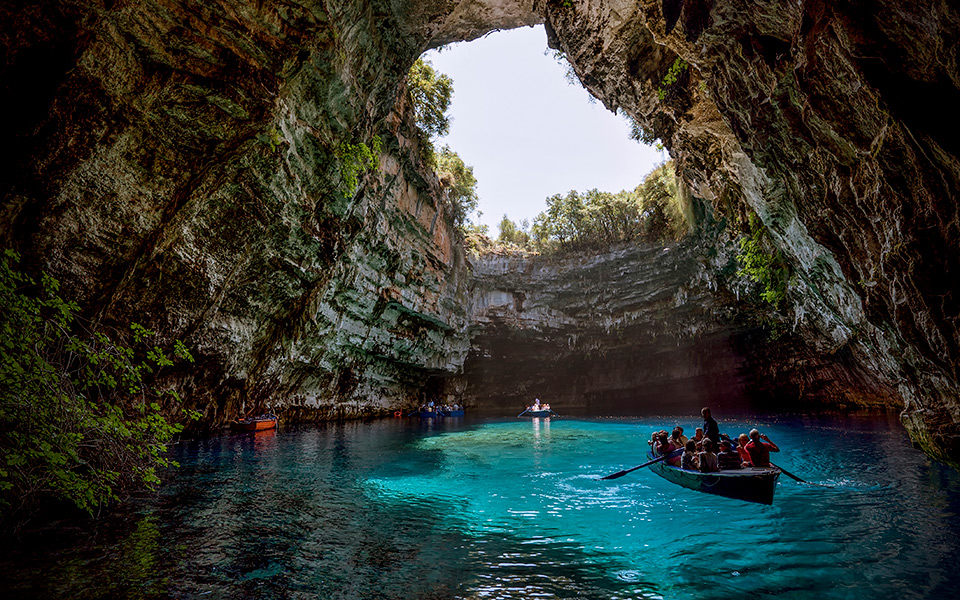
Melissani Cave is considered one of the most impressive lake caves in the world.
© Perikles Merakos
Nestled near the village Karavomilos on the enchanting Ionian island of Kefalonia, Melissani Cave is one of the most impressive lake caves in the world. This awe-inspiring cave, boasting turquoise waters, stretches over 3.5km in length, with dimensions reaching 40m wide and 36m high.
Forged through the intricate process of karstification, where water permeates calcareous rocks, Melissani Cave is a hugely popular tourist attraction on the island. Discovered in 1951 by speleontologist Giannis Petrochilos, its underground lake, unveiled by a collapsed roof, reveals a breathtaking spectacle of intricate stalactites and crystal-clear blue-green hues.
Steeped in mythology, the cave was the site of ancient worship dedicated to Pan and the nymph Melissani, with legends recounting the tragic tale of Melissani’s unrequited love for Pan (resulting in her suicide). Within this mystical realm lies an islet, home to Pan’s sanctuary, where Greek archaeologist Syridon Marinatos unearthed artifacts now housed in the Archaeological Museum of Argostoli.
Guided boat tours take visitors on a subterranean journey, traversing tunnels to reach the lake’s serene waters and nature’s sculptural wonders.
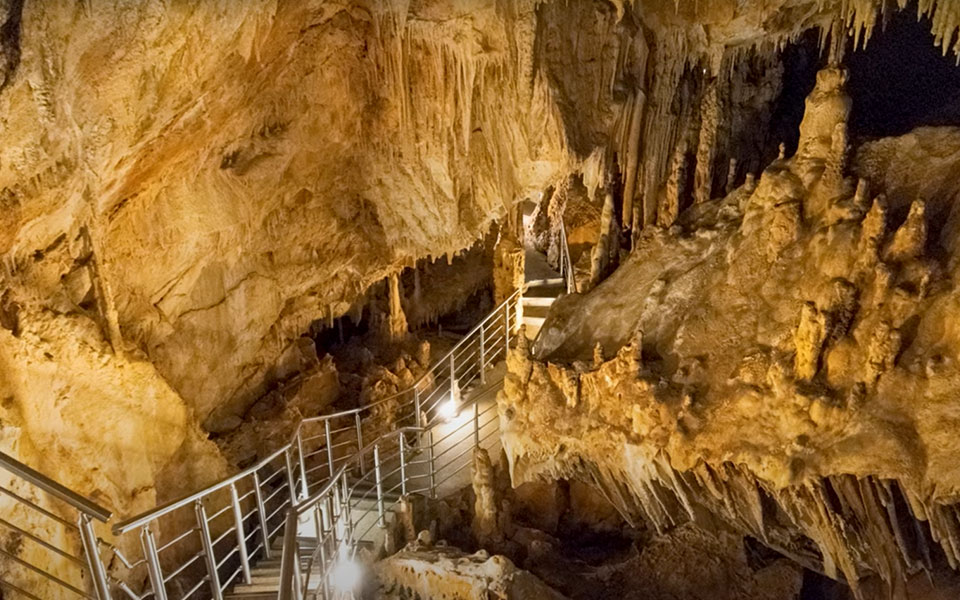
Koutouki Cave of Paiania, Attica
Nestled within the subterranean network of Mount Ymittos, 35km east of central Athens, Paiania Cave owes its existence to the remarkable solubility of limestone in rainwater, shaping alien-like rock formations over countless millennia. This natural process has endowed the cave with a rich tapestry of stalactites and stalagmites.
Discovered by accident in 1926, when a hapless goat fell through the roof, systematic exploration came several decades later, in 1954, by Yannis and Anna Petrochilos of the Hellenic Speleological Society. Due to its impressive size – 38.5m in height and some 350m in length – colossal rock formations, and striking reddish hues caused by iron oxide, the Koutouki Cave soon became a popular tourist attraction.
Once of the cave’s most striking features is its cavernous central chamber, measuring an impressive 60m by 60m, subdivided by stalagmites, stalactites, and columns into smaller, yet equally enchanting, chambers.
Maintaining a comfortable ambient temperature of 17°C, Paiania Cave now welcomes visitors through an artificial entrance, thoughtfully constructed to facilitate accessibility as part of ongoing efforts in tourist development. As a day trip from nearby Athens, Koutouki Cave is hard to beat.
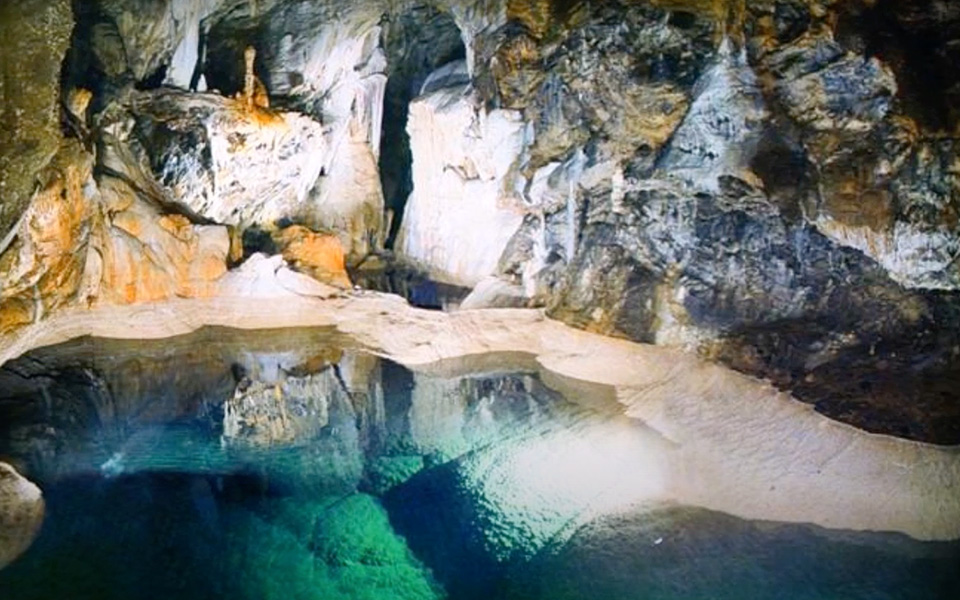
Cave of the Lakes, Kastria, Peloponnese
Heading south into the Peloponnese, the famous “Cave of the Lakes” is nestled in the village of Kastria, Achaia, just 17km from Kalavryta. Visitors here can explore 500m of labyrinthine passages, where impressive stalactite and stalagmite formations adorn every turn. But what makes this cave utterly unique is its remarkable cascade of 13 stagnant lakes – hence the name – spanning three distinct floors.
With an explored length of 1,980m, visitors enter through an artificial tunnel, leading directly to the awe-inspiring second floor. Here, amidst the ancient rock formations, remnants of human fossils and a variety of animal remains, including a hippopotamus, offer glimpses into the cave’s rich history.
In winter, as snow melts, the cave transforms into a subterranean river, overflowing with natural waterfalls. Summer unveils a completely different landscape, as parts of the cave dry up, revealing stone basins and dams towering up to 4m in height.
Traversing the 13 lakes within, visitors can navigate the labyrinthine corridors via small suspension bridges, marveling at the natural wonders.
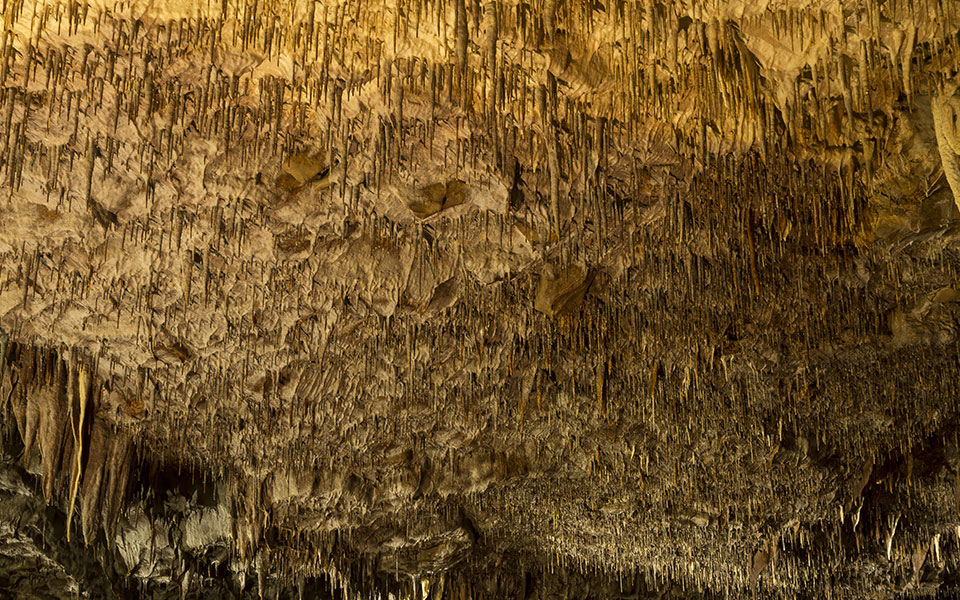
Kapsia Cave, Arcadia
© Shutterstock
Situated beneath the Ski Center of Mainalo, 1.5km from the village of Kapsia in the heart of the Peloponnese, lies the captivating Kapsia Cave.
Discovered in 1887 by French archaeologist Gustave Fouzer during his excavations in nearby Mantineia, the cave was systematically explored in 1892.
Measuring 380m in length, the cave unveils a rare and majestic spectacle of vibrant colors, intricate patterns, and natural formations. Approximately 6,500 square meters have been meticulously explored, revealing artifacts from the Neolithic period (New Stone Age), evidence of ancient floods, human remains, and clay lamps dating back to the 4th and 5th centuries AD.
Venturing deeper, visitors encounter a labyrinth of small and large chambers, winding passages, and breathtaking complexes of stalactites and stalagmites, some towering over a meter in size. The “Wonder Room” boasts a mesmerizing display of white stalactites cascading from the ceiling, complemented by colorful stalagmites adorned with unique patterns and hues.
Today, scientists assert that the cave holds global significance in the realm of speleology, and is poised to become a premier tourist attraction.
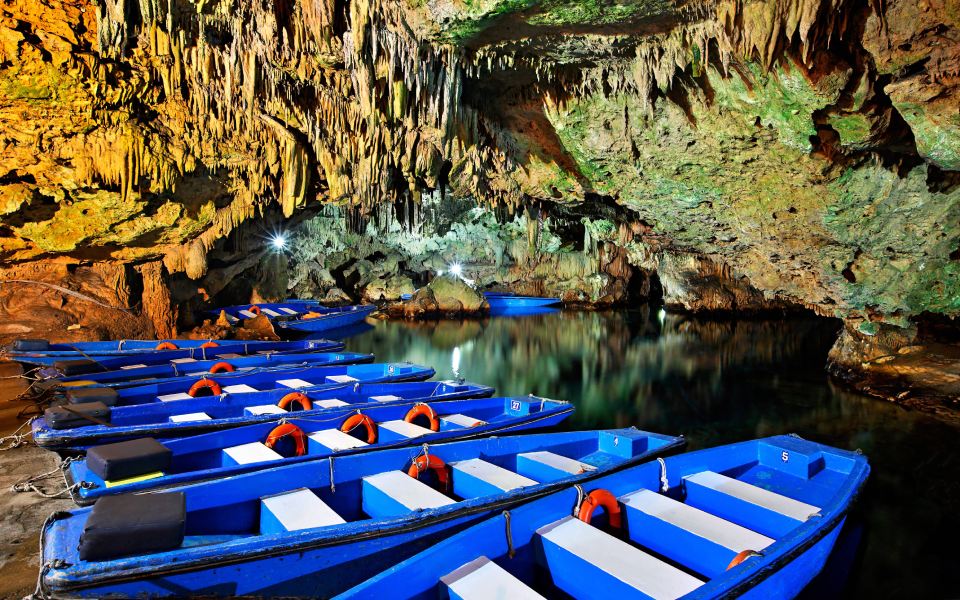
Diros Caves, Mani
© Shutterstock
The Diros Caves, located midway down the west coast of the Mani Peninsula in the southern Peloponnese, are among the most impressive in the world.
Nestled within the picturesque bay of Diros, the wondrous Vlychada Cave, the largest in the complex of three (the others being Alepotrypa and Katafygi), has captivated explorers and locals alike with its elongated white stalactites and stalagmites, impressive waterfalls, and glittering crystals.
Discovered in 1949 by Giannis and Anna Petrocheilou, founders of the Hellenic Speleological Society, Vlychada Cave’s initial exploration unveiled a mere glimpse of its vast expanse. Over the decades, its secrets have unfolded, with nearly 15km of passageways now mapped and explored. The cave’s allure extends underwater as well, where an underground river meanders, eventually merging with the sea.
Spanning both terrestrial and underwater realms, the cave began to form hundreds of thousands of years ago. Due to rising sea levels since the end of the last ice age, many of the cave’s most impressive stalactites and stalagmites are now submerged, at depths of up to 71m, explored by specialist teams of cave divers.
The cave is also home to an impressive collection of fossilized bones, belonging to prehistoric hippos, panthers, and lions, as well as deposits of Neolithic pottery, offering glimpses into the cave’s storied past.
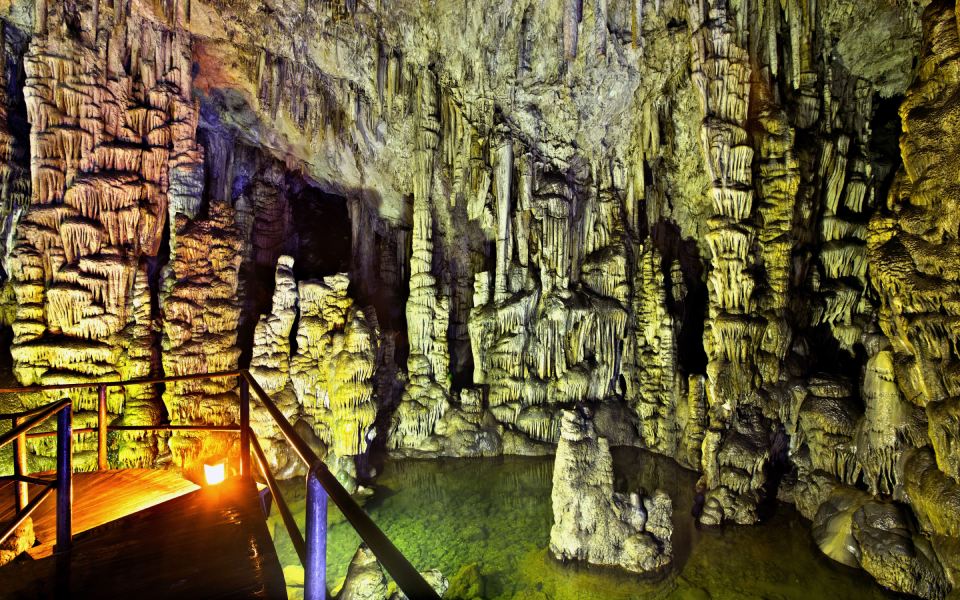
Diktaean Cave, Agios Nikolaos, Crete
© Shutterstock
Steeped in ancient Greek mythology, Dictaean Cave on the island of Crete, is the fabled birthplace of Zeus, king of the Olympian gods. According to tradition, the Titaness Rhea sought refuge here, concealing her son Zeus from the devouring jaws of Cronus, his father. It was also within these rocky confines that Zeus, smitten with love for the Phoenician princess Europa, took the form of a bull and embarked on a journey of romance and intrigue.
Perched near the village of Psychro, nestled amidst the rugged slopes of Mount Dikti at an elevation of 1,025m, the cave, known locally as Psychro, stands as one of Crete’s premier archaeological sites.
Entering the cave, visitors encounter wild rock doves and bats, roosting overhead. The route continues along a well-maintained path, leading 250m into the heart of the cave. Here, in the central hall, lurks the majestic stalactite known as “the cloak of Zeus.”
Evidence of ancient worship abounds, with remnants of altars and votive offerings embedded in the rocks, attesting to the cave’s sacred significance. Many of these artifacts now reside in the Archaeological Museum of Heraklion.
Beneath the busy streets of modern...
Discover the lesser-known oracles of ancient...
From olive presses and traditional costumes...
Lost to earthquakes, swallowed by the...